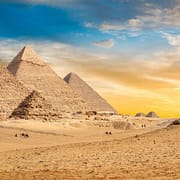What Is the Good News of Yeshua? (Part 16)
Faulty, frail, imperfect Israel had long been waiting at the foot of God’s mountain. There, He brought Heaven to earth in preparation for the journey—and the purpose—of their lives. Through the giving of the commands, the construction of the Tent, and the creation of the priesthood, God introduced His people to the means for the remediation of sin. Not only would it form the foundation for their forgiveness, but the bloody basis for the atonement and reconciliation of the world. Read more













